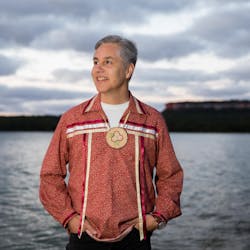Law's nature: Finding unity through creation
- Details
- Resources
This presentation explores the spiritual dimensions of building community, drawing on Anishinabe creation stories, teachings, and laws, as well as insights from other traditions including the Bahá’í Faith. Themes examined include how we can draw on insights from the natural world to deepen our understandings of spiritual principles such as love and forgiveness, as well as gain insight into what reconciliation means in all aspects of our lives.
John Borrows
John Borrows B.A., M.A., J.D., LL.M. (Toronto), Ph.D. (Osgoode Hall Law School), LL.D. (Hons., Dalhousie, York, SFU, Queen’s & Law Society of Ontario), D.H.L, (Toronto), F.R.S.C., O.C., is the Canada Research Chair in Indigenous Law at the University of Victoria Law School in British Columbia, and Loveland Chair in Indigenous Law at the University of Toronto Law School. His publications include, Recovering Canada; The Resurgence of Indigenous Law (Donald Smiley Award best book in Canadian Political Science, 2002), Canada's Indigenous Constitution (Canadian Law and Society Best Book Award 2011), Drawing Out Law: A Spirit's Guide (2010), Freedom and Indigenous Constitutionalism ((Donald Smiley Award best book in Canadian Political Science, 2016), The Right Relationship (with Michael Coyle, ed.), Resurgence and Reconciliation (with Michael Asch, Jim Tully, eds.), Law’s Indigenous Ethics (2020 Best subsequent Book Award from Native American and Indigenous Studies Association, 2020 W. Wes Pue Best book award from the Canadian Law and Society Association). He is the 2017 Killam Prize winner in Social Sciences and the 2019 Molson Prize Winner from the Canada Council for the Arts, the 2020 Governor General’s Innovation Award, and the 2021 Canadian Bar Association President’s Award winner. He was appointed as an Officer of the Order of Canada in 2020. John is a member of the Chippewa of the Nawash First Nation in Ontario, Canada.

46th Annual Conference
The views expressed in this recording are those of the presenter and do not necessarily represent the views of the Association for Bahá’í Studies, nor the authoritative explications of Bahá’í writings.